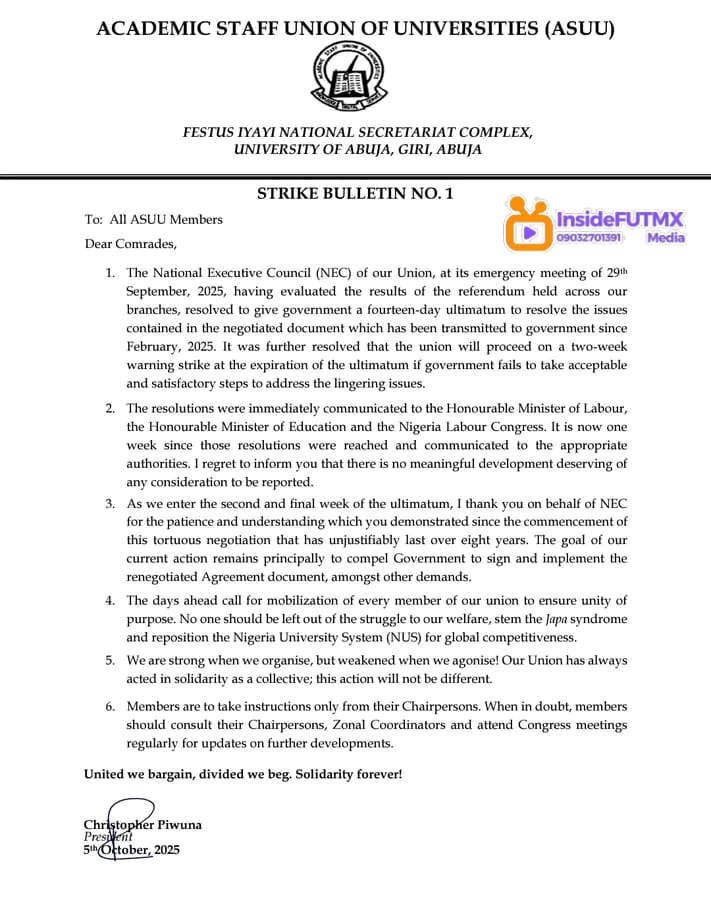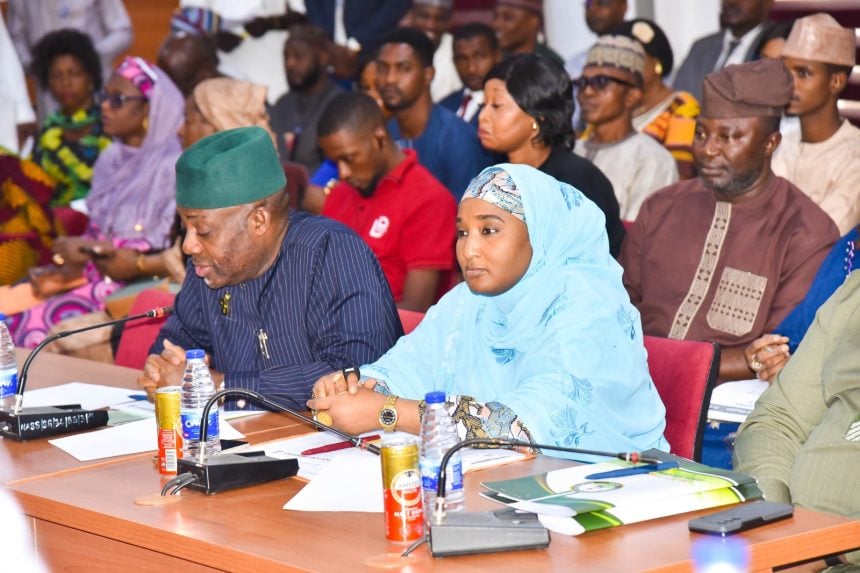Nigeria’s public universities are once again sitting on a powder keg of uncertainty as the Academic Staff Union of Universities (ASUU) begins the second and final week of its 14-day ultimatum to the Federal Government.
It has now been seven days since the Union’s National Executive Council (NEC) declared the ultimatum, warning that if the government fails to act on their long-standing demands, ASUU will embark on a two-week warning strike — a move that could once again disrupt academic activities across campuses nationwide.
As the clock ticks, the silence from Abuja has only deepened tension across Nigeria’s tertiary institutions. Students, parents, and lecturers are anxiously watching as the days slip by, wondering if the nation’s university system is about to face yet another round of industrial action.
A Recap of the Ultimatum: ASUU’s Growing Frustration
At its emergency meeting held on September 29, 2025, the National Executive Council of ASUU reviewed the outcome of a nationwide referendum conducted across its various branches. After analyzing the feedback, the union resolved to give the Federal Government a 14-day ultimatum to implement the renegotiated ASUU-FGN agreement transmitted to the government in February 2025.
The resolution, made public through Strike Bulletin No. 1, was signed by ASUU President Professor Christopher Piwuna and dated October 5, 2025. The bulletin explained that the government’s failure to take “acceptable and satisfactory steps” to resolve key issues would trigger a two-week warning strike.
According to ASUU, the ultimatum followed years of “unjustifiable” delays in fulfilling promises made to the union, despite repeated meetings, negotiations, and agreements. The document lamented the government’s consistent pattern of signing deals it fails to honor — a trend that has fueled distrust and disillusionment among lecturers.
“I regret to inform you that there is no meaningful development deserving of any consideration to be reported,” ASUU’s president wrote, confirming that since the resolutions were forwarded to relevant ministries, no concrete response had been received.
The Key Demands: What ASUU Wants This Time
ASUU’s demands, though familiar, remain crucial to the survival and competitiveness of Nigeria’s university system. The union insists that its latest push is not about politics or personal gain, but about reviving an education system that has suffered years of neglect.
Here’s what ASUU wants the Federal Government to address immediately:
- Implementation of the 2025 Renegotiated Agreement between ASUU and the Federal Government.
- Release of withheld salaries and earned academic allowances owed to lecturers.
- Payment of promotion arrears and correction of salary shortfalls.
- Revitalization funding to upgrade infrastructure in public universities.
- Adoption of the University Transparency and Accountability Solution (UTAS) for payroll management instead of IPPIS.
- Restoration of autonomy to universities, ensuring councils can function independently.
- Commitment to sustainable funding for research, development, and welfare.
These issues, according to ASUU, are not new — they date back to the 2009 FGN-ASUU Agreement, which has been renegotiated multiple times but never fully implemented. The latest round of negotiations concluded in early 2025, but the government has yet to act.
One Week Gone, Still No Progress
As of today, one week has passed, and the situation remains unchanged. The government has not made any public announcement addressing ASUU’s concerns, nor has there been evidence of behind-the-scenes progress.
Lecturers across campuses are growing restless, with some ASUU branches already beginning mobilization exercises in anticipation of a possible strike.
Sources from several universities, including those in the South-West and North-Central zones, told newsmen that local branch meetings have intensified, with discussions centered on strategies for collective action should the government ignore the ultimatum.
Students, on the other hand, have taken to social media to express anxiety and frustration, fearing that another strike could derail their academic calendar once again.
“We just resumed not long ago, and now another strike threat? This is exhausting,” one student wrote on X (formerly Twitter).
Why ASUU Says This Fight Is Different
In the words of ASUU’s president, the ongoing struggle is not just about salaries but about saving the soul of Nigeria’s public universities.
He described the current phase as a “principled and unavoidable action” aimed at compelling the government to act responsibly. According to him, ASUU’s fight is also about stopping the “Japa syndrome” — the mass exodus of Nigerian academics and students seeking better opportunities abroad due to poor working and learning conditions at home.
“No one should be left out of the struggle to our welfare, stem the Japa syndrome, and reposition the Nigerian University System for global competitiveness,” he declared in the bulletin.
Government’s Silence and the Looming Crisis
So far, the Federal Government has maintained a notable silence. Neither the Minister of Education nor the Minister of Labour has issued a clear response since the ultimatum began.
This quietness, some analysts believe, might be a sign that government officials are either downplaying the seriousness of ASUU’s threat or working behind closed doors to avert an immediate crisis.
However, history shows that ASUU’s patience has limits. If the pattern of unfulfilled promises continues, the union may have little choice but to activate its warning strike as planned — a move that could once again bring Nigeria’s universities to a halt.
Students, Parents, and Stakeholders React
Across the country, students and parents are expressing mixed feelings. While some support ASUU’s struggle for better funding and conditions, others worry that another strike could cause irreparable damage to academic progress.
Many Nigerian students are still recovering from the 2022 eight-month strike, which delayed graduations, disrupted NYSC schedules, and pushed thousands of students to seek education abroad or in private institutions.
Education experts have also weighed in, warning that repeated strikes are eroding the reputation of Nigeria’s universities globally and making it difficult for graduates to compete in international markets.
“When universities shut down for months every other year, it damages the credibility of the system and demotivates students. The government must find a sustainable way to resolve these issues once and for all,” said one education analyst.
Possible Scenarios: What Happens Next
With one week remaining in the ultimatum, several possible outcomes are on the table:
| Scenario | Description | Likelihood | Impact |
|---|---|---|---|
| Government Meets Demands | The FG acts swiftly to meet some of ASUU’s key demands, leading to dialogue and suspension of the planned strike. | Low | Temporary relief, possible future renegotiations. |
| ASUU Proceeds with Warning Strike | If no progress is made, ASUU activates a 2-week warning strike. | High | Universities shut down nationwide; lectures and exams halted. |
| Prolonged Industrial Action | If the warning strike yields no results, ASUU escalates to an indefinite strike. | Moderate | Long-term disruption, national attention, and possible political fallout. |
| Last-Minute Negotiations | Government intervenes just before the ultimatum ends to broker a quick deal. | Moderate | Could temporarily calm tensions, but sustainability uncertain. |
The Bigger Picture: Why This Matters for Nigeria
The stakes of this standoff go far beyond ASUU’s internal demands.
A stable and well-funded university system is the backbone of any nation’s development. Frequent strikes and government inaction not only disrupt education but also push the best brains out of the country.
The issue has also become a test of policy consistency. Successive administrations have repeatedly promised to reform the education sector, yet funding allocations and implementation rates remain low.
Unless urgent and sustainable reforms are undertaken, the future of Nigerian higher education will remain trapped in cycles of strikes and negotiations.
Conclusion: A Nation Waiting on Abuja
As ASUU’s 14-day ultimatum enters its final stretch, the entire education sector waits anxiously for the Federal Government’s next move.
Will there be a genuine resolution this time, or are Nigerians about to witness another shutdown of universities across the country?
For now, ASUU insists it remains open to dialogue — but only if the government shows seriousness. Until then, the clock continues to tick, and the fate of millions of students hangs in the balance once more.
“United we bargain, divided we beg. Solidarity forever,” the ASUU president concluded in the bulletin.



